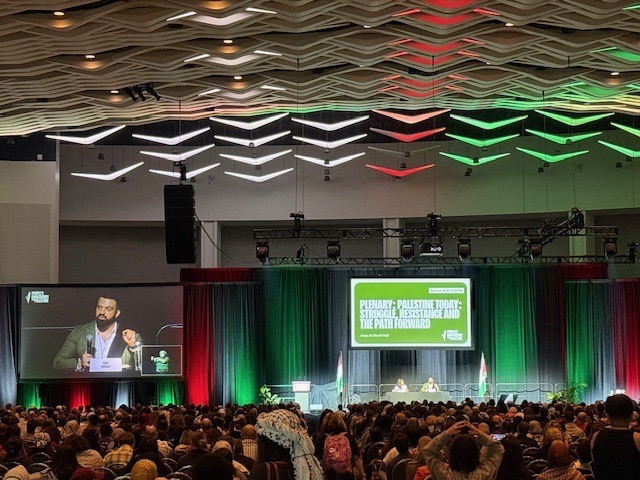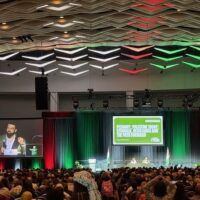


































































2nd Annual People’s Conference for Palestine. Photo by Jonathan Urmeneta.
The Heartbeat of Solidarity
Thousands gathered in Detroit for the 2nd Annual People’s Conference for Palestine. Established doctors, activists, journalists, political leaders, and people of conscience convened in Detroit, Michigan, to discuss humanity’s most pressing issue: the Gaza Genocide. The conference was a three-day event that featured daily workshops and discussions on advancing liberation efforts. Vendors were also on hand, selling Palestinian merchandise and promoting politically motivated organizations. Even Palestinians from the West Bank, who face this daily burden, were well represented at the conference after struggling to get a Visa. In many ways, this conference was an extension of the Palestinian resistance and the moral core of America.
Doctors Stand with Palestine
Many prominent figures lent their voices to the conference. One of these well-known figures was former Green Party Presidential Candidate and Anti-Zionist Jew, Jill Stein. Throughout her candidacy, she was one of the most staunch critics of the Israeli government and the Gaza genocide. She was even arrested during the student protests at Washington University and charged with assaulting a police officer. At the People’s Conference for Palestine, she spoke on a panel of fellow doctors representing Doctors Against Genocide, including a doctor who served in Gaza: Dr. Thaer Ahmed.
Stein offered a simple message of hope and defiance: “In the court of public opinion, we have won, we have won!” She also said that a vital decision in the United Nations is coming that could change the reality on the ground in Gaza, giving Palestinians a lifeline.
“A year ago, they [the UN General Assembly] gave Israel one year to comply with the rulings of the International Court of Justice to end genocide, end occupation, end ethnic cleansing and at that time the General Assembly said Israel had one year and they were going to face consequences. Well, that date is coming up. That is around the corner, it’s September 18. Starting on that date and even before, the UN can impose…severe and serious policies on Israel including comprehensive sanctions, military embargo stripping Israel of its credentials in the General Assembly as it was done to South Africa and sending in a peace force to protect civilians and distribute aid and food,” Stein said.
Among the voices at the conference was Basma Karaja, a retiree from Cleveland, Ohio. She rejected reliance on international bodies and instead highlighted the power of people-led initiatives as the way forward.
“She [Jill Stein] referred to the General Assembly and the UN for most of her speech. I don’t rely on either one of them, I feel that it has no jurisdiction to impose any sanctions or arm embargo against Israel. They are just an extension of the White House. She said the United States can not be changed. Anything could be changed, I believe. Otherwise, nothing is impossible. She talked about her website, Lifeline for Palestine. It’s a great idea to have a website for Palestine to keep people informed and engaged in helping people in Gaza and Falasteen to stay on their land,” said Karaja.
Student Activism: Mahmoud Khalil Leads the Way
A voice to transcend the political divide and create social movements, student activist Mahmoud Khalil made his presence felt at the conference. He commanded droves of students to rise to confront his university’s complicity in the Gaza genocide. This did not come without a cost. After spending several months in ICE detention for his activism at Columbia University, through a vigorous legal battle, he emerged triumphant. At the conference, he riled up the crowd of 4,000 before giving his speech, with the crowd chanting “Disclose! Divest! We will not stop, we will not rest!”
“This is our moral duty to speak up in a time of genocide. Palestine is the compass, but here’s the thing, what does it mean? It cannot just be a slogan, it must guide us. How we act and how we build,” Khalil said.
Another attendee at the event was asked how she viewed Khalil’s speech and the months of repression he faced for his activism. Walan Kanan, a psychotherapist from Toledo, Ohio, is a staunch advocate for her people and sees Khalil as a conduit for Palestinian liberation.
“Mahmoud Khalil’s speech was inspiring, grounding, and put law into perspective. I feel as though many of us, who actually have the privilege of citizenship, often shy away from advocacy efforts, because we are worried about some type of backlash we may get. But Mohamoud on the other hand, who truly has more at risk than many of us, chose to not stay silent, even after his detention. He showcases that there’s no room for selfishness in this movement and that the reality is, if they’re coming for one of us, it’s more productive for us to understand that they are coming for us all,” Kanan said.
The post From Detroit, a Defiant Call for Palestinian Liberation appeared first on CounterPunch.org.
This post was originally published on CounterPunch.org.